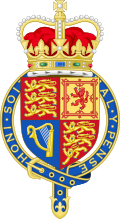Lord President of the Council: Difference between revisions
Jump to navigation
Jump to search
No edit summary |
mNo edit summary |
||
| Line 3: | Line 3: | ||
| insignia = Royal Arms of the United Kingdom (Crown & Garter).svg | | insignia = Royal Arms of the United Kingdom (Crown & Garter).svg | ||
| insigniacaption = Arms used by the [[Privy Council]] | | insigniacaption = Arms used by the [[Privy Council]] | ||
| userid = | | userid = 2979399851 | ||
| incumbent = [[ | | incumbent = [[NotApplicab1e]] | ||
| incumbentsince = | | incumbentsince = 12 December 2023 | ||
| department = [[Privy Council]] | | department = [[Privy Council]] | ||
| style = The Right Honourable | | style = The Right Honourable | ||
| Line 11: | Line 11: | ||
}} | }} | ||
The '''Lord President of the Council''' is the presiding officer of the [[Privy Council]]. The Lord President usually attends and is responsible for chairing the meetings of the Privy Council, presenting business for the approval of the [[Monarchy|sovereign]]. In the modern era, the incumbent is by convention always a member of one of the Houses of [[Parliament]], and the office is normally a [[Cabinet]] position. | The '''Lord President of the Council''' is the presiding officer of the [[Privy Council]]. The Lord President usually attends and is responsible for chairing the meetings of the Privy Council, presenting business for the approval of the [[Monarchy|sovereign]]. In the modern era, the incumbent is by convention always a member of one of the Houses of [[Parliament]], and the office is normally a [[Government|Cabinet]] position. | ||
Latest revision as of 16:34, 21 December 2023
| Lord President of the Council | |
|---|---|
 Arms used by the Privy Council | |
Incumbent | |
| Privy Council | |
| Style | The Right Honourable |
| Appointer | The Sovereign on advice of the Prime Minister |
The Lord President of the Council is the presiding officer of the Privy Council. The Lord President usually attends and is responsible for chairing the meetings of the Privy Council, presenting business for the approval of the sovereign. In the modern era, the incumbent is by convention always a member of one of the Houses of Parliament, and the office is normally a Cabinet position.